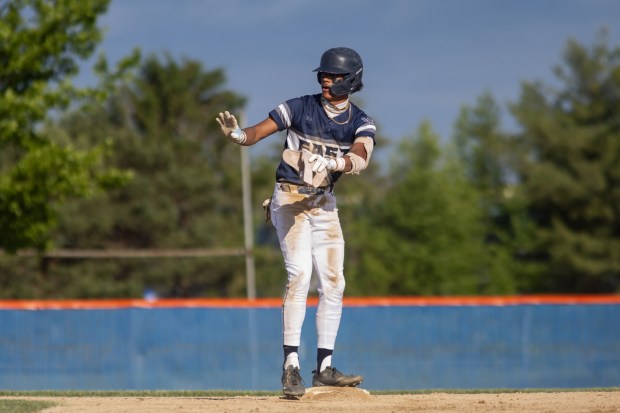A Cook County judge will issue a ruling this week in the lawsuit brought by the city’s largest police union that seeks to enforce an arbitration award that would allow the most serious police misconduct cases to be decided behind closed doors.
About two months after the lawsuit was filed, along with hundreds of pages of motions and exhibits, attorneys for the Fraternal Order of Police and the city on Wednesday presented about an hour of oral arguments to Judge Michael T. Mullen at the Daley Center.
Mullen’s ruling in the case will likely be announced in writing early Thursday, though it could come as early as late Wednesday, “and I suspect neither side will be entirely happy with the decision I will make,” Mullen said.
The dispute over police discipline stems from contract negotiations between the city and the FOP last summer.
The arbitrator overseeing those talks, Edwin Benn, issued an award to the union that granted officers accused of serious misconduct a choice in how their cases would be adjudicated. As public sector employees represented by a collective bargaining unit, Benn said, CPD officers have the right to have misconduct cases decided by a third party outside of public view.
In December, Mayor Brandon Johnson opted to split the tentative contract proposal into two votes. The first — described as the “economic package” — was approved by the City Council without any questions posed to city negotiators. That package provides CPD officers with a 20% raise over four years, while also creating a new disciplinary mechanism to more quickly adjudicate minor misconduct cases.
The second package, which deals only with the most serious cases of misconduct, was voted down three times by aldermen, most recently in February.
“On its merits, the argument effectively raised by the city is, ‘We know it’s the law, but we don’t want to follow it,’” FOP attorney Matt Pierce told Mullen Wednesday. “That is not a basis to vacate an interest arbitration award.”
James Franczek, the city’s chief labor negotiator, said no judge has ever ordered the city to enter a collective bargaining agreement that was not approved by the City Council, and he characterized Benn as an out-of-touch North Shore denizen largely ignorant to the city’s problems.
“He lives in an isolated, myopic, frankly, bucolic world,” Franczek said, “… and doesn’t have an appreciation for the considerable challenges of the city of Chicago.”
Since the union’s inception in the 1980s, the FOP’s contract with the city has provided that the most serious police misconduct cases — those where the city seeks to fire an officer or suspend them for at least a year — be decided by the Chicago Police Board.
Those hearings, as well as the board’s findings and decisions, are made publicly available. Enforcement of the arbitration award at issue would give accused officers a choice to instead have those cases heard and decided by a third-party arbitrator out of public view.
Many of the cases decided by the police board stem from investigations conducted by the Civilian Office of Police Accountability.
After completing an investigation, COPA sends its findings and recommendations to the superintendent of the CPD, who then has 90 days to review the case materials and decide if he agrees. If he does, attorneys for the superintendent will bring administrative charges against an officer.
If the superintendent disagrees with COPA, a single randomly selected member of the Police Board decides if an officer will face charges and an evidentiary hearing. That process, a “request for review,” played out for the first time under CPD superintendent Larry Snelling’s tenure earlier this year when the CPD brought charges against an officer involved in a fatal shooting in 2019.
A deluge of closed misconduct investigations prompted Snelling to sharply criticize COPA during the February meeting of the Chicago Police Board. Snelling accused misconduct investigators of injecting opinions and personal biases that resulted in excessive penalties for CPD officers.
“What we’re seeing are egregious penalties for extremely minor infractions,” Snelling said. “Now, oftentimes when I go through these reports, I agree that the infraction should have been sustained, but a 30-day (or) 90-day suspension is egregious.”
Scott Spears, CPD’s chief legal counsel, said during February’s Police Board meeting that the 28 separation cases the Police Department received in the first two months of 2024 nearly matches 2023’s total of 32. Those 28 new case findings and recommendations — each of which requires approximately 40 hours to review — will be handled by just five sergeants assigned to CPD’s office of legal affairs and will require substantial overtime, Spears said.
COPA’s chief administrator, Andrea Kersten, said the City Council’s approval of most of the new FOP contract forced the agency to wrap up any investigation more than 18 months old. She also noted that COPA does not impose discipline for CPD officers, as those decisions rest with the CPD and Police Board.





